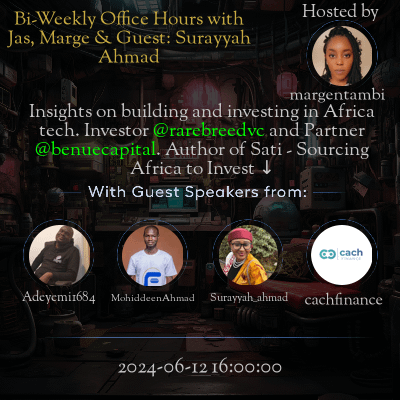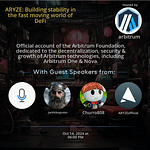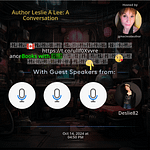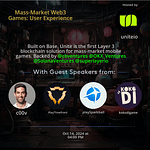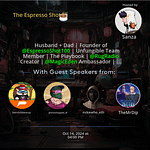This space is hosted by margentambi
Space Summary
The Twitter space highlighted a telematics solution tailored for insurance companies, pitching innovative aspects like using phone technology for driving detection and unique billing modes. It stressed the advantages of no excess buybacks and direct deductions from claims, addressing the importance of reliable consumer credit systems and hinting at potential expansion into the healthcare sector. The discussion also underscored the significance of infrastructure development alongside software. Bi-Weekly Office Hours with Jas, Marge & Guest: Surayyah Ahmad, were also mentioned, emphasizing scalability and overcoming language barriers while enhancing digital skills. Participants showed enthusiasm for venture capital opportunities and mentorship, expressing appreciation for the session and excitement for future engagements.
Questions
Q: How does the app detect driving activities?
A: The app automatically detects driving activities.
Q: What are the different billing modes available?
A: Different billing modes for driving and parking scenarios, such as drive and park modes.
Q: Are there any excess buybacks involved in the billing process?
A: Users enjoy benefits without excess buybacks for coverage.
Q: How are claims handled in terms of deductions?
A: Claims are handled with direct deductions if necessary, without additional charges.
Q: What is the focus concerning reliable consumer credit systems?
A: Exploration of the significance of government interest in consumer credit systems.
Q: Any insights on potential ventures into the healthcare sector?
A: Consideration of potential ventures in the healthcare industry.
Q: What is the approach towards building infrastructure alongside software development?
A: Emphasis on the importance of building infrastructure alongside software development.
Q: Any closing remarks or future session previews?
A: Expressions of gratitude towards participants and excitement for upcoming sessions.
Highlights
Time: 00:09:26
Pitching Format Explanation, Founders are briefed on the pitching format required for investor presentations.
Time: 00:14:43
eLearning Startup Pitch for Digital Skills in Hausa, A founder presents an eLearning startup specializing in teaching digital skills in the Hausa language.
Time: 00:19:04
Scalability Inquiry by Saraya, Saraya raises questions about the scalability and expansion strategies of the presented startup.
Time: 00:23:24
Discussion on Revenue Model Realignment, The importance of identifying paying users and refining the revenue model is deliberated.
Time: 00:32:23
Market Positioning Query by Saraya, Saraya inquires about the market positioning strategies and differentiation from competitors.
Time: 00:41:05
Comparing Family Office and VC Due Diligence, Differences in the due diligence processes between family offices and venture capitalists are discussed.
Time: 00:49:05
Emphasis on Early-Stage Planning Significance, Insights shared on the critical role of early-stage planning and thorough market research prior to product launch.
Time: 00:57:07
Customer Feedback Importance for Product Enhancement, The significance of collecting and analyzing customer feedback for refining product offerings is underscored.
Time: 01:08:41
Investor Enthusiasm for African Opportunities, Saraya expresses her excitement as an investor for the potential in African startup ventures.
Key Takeaways
- Discussion on utilizing phone technology for driving detection.
- Introduction to drive and park billing modes.
- Benefits of no excess buybacks for coverage.
- Direct deductions from claims if necessary.
- Focus on reliable consumer credit systems.
- Potential expansion into the healthcare sector.
- Importance of building infrastructure alongside software.
- Gratitude towards participants and anticipation for future sessions.
Behind the Mic
So. So when you get into your car driving, the app automatically knows that you're driving. So I get this question a lot of time. How does the app knows that I'm driving? So we built on the technology that is available on phones. It's called gyroscopy or something like that, wherein, for example, when you take like, 8000 or 10,000 step, your phone tells you, well done, you've taken 10,000 steps today. So that's. That is what we built that on, such that once you get into your car driving, the app automatically knows and start billing you on drive mode. When you get to a place on your park, even when you get into traffic and your car idos, you start getting charged on park mode. Now, on drive and park mode, it's the same benefits you have. There's no excess buyback. I mean, there's no excess. We're deducting from your cover. Your. If you have a claim, there's no excess. We're deducting from your claim. Your. You get the same loyalty benefits. You get the same value added services, which I think is also unique because for the first time you understand the value added services that come with an insurance policy. It's as stated as simple as possible. This is what you're entitled to. And you see these services as you continue. Every two or three kilometers, you keep seeing the value added services that if you run out of fuel, you have someone to call. If you need a doctor, you need something, you have someone to call and these are always available at any time. So you get that on buy as you drive cover. And if you are going to buy buy as you drive cover, you should know that some covers like that are deductible after a certain period. They expire after a period. They are only available for a period of time and you have to buy them over and over. Wire has evolved beyond that. It's a monthly subscription at the moment for most users, and that makes it easy for you. Your transaction is simplified. You don't need to reapply once you already have your car insurance. And then you can cancel it anytime you want. So that's one. Now, pay as you drive cover is also unique because like we said earlier, people, insurance in Nigeria is quite expensive. The average insurance in Nigeria goes for around NGN 200,000 a month. It's from 100,000 to 200,000 on the average. There are outliers where you have more expensive insurance covering a group of up to NGN 1 million per year, especially for trucks and all that. There are some that are also cheaper than that, but we average it around the average that you see. So it's quite expensive. For the pay as you drive cover, what we've been able to do is customize flexible pricing to make sure that it's exceedingly generous for you. So for example, an NGN 100,000 comprehensive cover on buy as you drive could get as low as 60,000 or 55,000. And the best part is that you can have installments. You can pay portionally through the months to cover a period of six or twelve months. And that's really what we have built on. Lastly, you can experience peace of mind when you have buy as you drive cover. That's instead of paying for what you don't need. And it's always active. 24 hours your car is insured. Six in the morning, your car is insured. Saturday to Wednesday your car is insured. So that's, that's quite different. So yes, that is unique. Another issue that has been pointed out is challenges insurance companies are facing. Every day, companies are popping up and one day they'll fold. And usually claims mostly take a long time to resolve. But with buy as you drive, we've been able to somewhat reduce that time. We've built processes in wait times and technology to make our claim process almost seamless for our customers. What we've been able to do is build a network of services in Nigeria and extend that to other areas like West African countries, wherein you experience peace of mind. If it's 630 in the morning and you have a claim, then we're able to service that. And then these reliable offers that we've built, and the best part, a 24 hour service. So you buy an insurance cover, you drive, you park, and you experience a peace of mind that comes with 24 hour cover. Instead of paying for a physical card, it's available on your phone at a click of a button. So user access, and customer experiences are exceeded. Another thing is we've built a community where if you're buying a cover from us, you always know that you pay as you drive. And it's always active. Especially those who drive a lot, busy day guys, long haul drivers. You can service yourself anywhere you want and rest assured that your insurance is always on. 24 hour cover. That's why I'm excited about this. Very excited, actually. So I decided to join the conversation, not sitting back and assuming that I would be in front of a screen. But to let you know that what excites me most about this product is the use of technology that makes pay as you drive the most unique proposition anywhere in the world. Now, I know where there are driving pay per miles or pay per second or minute types of insurance cover. But our technology helps you with that automatic reporting and immediate settlement of claims. And that, to me, is technology at its best. It's leveraging technology to improve services. Every transaction that you do with the car, stay in the car, comes to an end user survey with a get a free car wash, get a free tire, get free Add Blue, or just as simple as congratulations on reaching your destination wherever that may be. And then the app also helps you with directions, too. If you're confused at a place, it can easily direct you. So when you build an insurance plan that's quite apt for the African market, I think to that extent, I think I'm quite pleased that we've been able to look inwards, see what's there, and bring solutions. COVID presented us with quite a challenge. It was very hard initially, especially on the volume side of things. We wanted to get policies across to customers. And you know, insurance is one of the last things on people's minds when you need to get policies. Everyone was just waiting at home and hoping COVID would go away. So it was really hard converting people on the volume side. So we just had to come together as a team. There were so many meetings, over 300 meetings in a space of a month. And then we discussed diligently and found a way to get across that bridge, using that technology instantly, and so that people didn't even need to leave their homes to get policies. So COVID required a new kind of thinking and then that evolution is what brought about the advancements in the app. So the PECA, the PERCE, all of that was built on this notion of building proactive communities. So when we started hearing about people getting stuck on the road or needing to fix their cars and not knowing where to go, we thought again, you know what, let's listen to people and let's provide these services even before they get to tell us that this is what they want. And that is, for me, one of the things that makes pay as you drive a unique product. I think at this point maybe I should talk about underserved areas and what we call underserved areas. Insurance in Nigeria is not understood much. When you go to certain places and ask the question, and this was a research target that we took, which was really raw data, people asking them, what is insurance? You find that there are more areas that don't know what insurance is. They believe that it's something you buy, the police gets to see it, or documents. That's all insurance means to most people and that's quite scary because they never understood the value of insurance. They did not understand the value of insurance so in underserved areas we had a lot of engagement canvassing where we got agents to come in and explain to them what insurance is, what its value proposition is. For example, there may not be that much of insurance in semi-urban areas or semi-rural areas. We get our people to go there and tell them, engage with them, and show them. And most people don't know what insurance means and all that. Another thing we did was spend a lot of time being closer to our customers who were already within the urban vicinity and explaining why there's a need for insurance. Because I think insurance penetration in Nigeria is about two percent, and that's quite low. The average in Africa is about ten percent. South Africa is about sixteen percent. Kenya, Ghana, and others are higher. But Nigeria as at 2020 was about two percent, so there was a lot of work to do in getting people to understand this value. Government activity played also a huge role in helping consumers understand the value of insurance and the stability that insurance brings when certain things happen. The government provides and is still providing a lot of support to the insurance industry and one of the things that has really helped is the recognition of the insurance companies. In fact, in 2022, there was ENISA, a body of the insurance companies in Nigeria, and that body was able to form a drive towards digital insurance and ensure that most people could understand more about digital insurance, digital campaigns, how to come on board and its benefit. And that really helped in boosting and getting customers to understand the value of insurance. So that's, that's quite a bit about pay as you drive. And I think that's why it's a very unique product. And then coming off that, we experience a lot of engagements from there. So I, I think that's the reason why it's really great for people going into motor insurance for the first time, considering pay as you drive, for those who also have, appreciate some of the value it offers. And our next question, please. Thank you, Margaret. And for you, the founder and CEO of PWC Nigeria, what will be the major areas you think you'll be focusing on that really excites you this year? Thank you, Sharia. What excites me? Well, for me, financial inclusion, again, like I mentioned earlier, financial inclusion is very big for me. Find that a lot of people, especially women, are excluded from the banking systems, insurance less penetration, and I think that needs to be fixed. Thank you. So that's, again, very high on my list. And then looking at exploring more business opportunities in inner cities. So the rural urban, moving people from the rural urban areas, I think those are key touch points. And my eyes are on areas that are not saturated yet with insurance products, so newer areas within the country that I know there's a lot of potential. Also, exploring buy now, pay later type initiatives, a lot of the markets you could see are emerging markets. So that's another very important area on my list. I know that a lot of people who are trying out new plans, understand how that evolves with the interest of a government in, especially in Nigeria, in starting to have a reliable consumer credit system. So that, yeah, basically that. And I'm keeping my eyes on healthcare. I'm not sure which vertical yet. I'm still of the opinion that while we're building telemedicine, we have no laboratories or hospitals to actually lead people to provide those services that the software is providing to them. So again, I am an unorthodox vc person. I still very much believe in building based infrastructure. Yeah. Thank you. Thank you so much, shariah, and thank you to everyone that joined us today. Keep a lookout for the next session coming out soon and I'll let you guys get back to the rest of your afternoons and evenings. Thanks again and I'll talk to you soon. Thank you, Margaret, thanks for having me. Of course. Thank you so much. Thank you. Thank you. Thank you.
